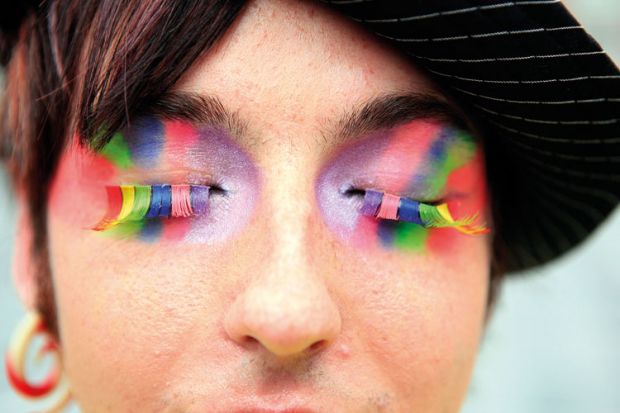Clear evidence that many LGBT (lesbian, gay, bisexual and transgender) students drop out of courses due to bullying means the issue should be a major concern for universities, quite apart from their duty of care.
That was among the points raised in a series of presentations at the Society for Research into Higher Education last week on the overt and hidden challenges faced by LGBT students in the UK.
All the presentations were linked to an ongoing research project, “From Freshers’ Week to Finals: using LGBT student perspectives of higher education to inform research and practice”, being carried out by Sheffield Hallam University with support from the International Lesbian, Gay, Bisexual, Transgender, Queer Youth and Student Organisation (IGLYO), the National Union of Students, the SRHE and others.
Eleanor Formby, a senior research fellow at Sheffield Hallam, presented results from a cross-European survey she had carried out for IGLYO. While it seemed to be true that “LGBT students overall…had a positive view of higher education”, 6 per cent of her sample “had ‘dropped out’ of university as a result of their experiences” and 19 per cent felt that “their ability to gain employment had been affected by prior experiences of bullying or discrimination”.
Yet even bullying could have a positive impact, with one respondent reporting an incident that led him or her “to retaliate with an ‘I’ll show them’ attitude, causing me to aim higher”.
It remained clear, however, that “LGBT experiences may directly impact upon retention rates”. That alone, in Ms Formby’s view, made the issue “reason for university concern…aside from the obvious well-being and rights-based arguments”.
Michael Keenan, lecturer in sociology at Nottingham Trent University, also reported on the results of an online questionnaire and follow-up focus groups he had used to examine the ways that universities can be seen as both “a site of diversity” and “a site of bullying, discrimination and sidelining – focussing on heterosexist and macho cultures”.
While almost 89 per cent of his respondents described their fellow students as generally “accepting”, this concealed worrying cases of LGBT students being treated as “exotic”, “erotic” or “other”.
Meanwhile, Vicky Gunn, head of learning and teaching at Glasgow School of Art, said that she was keen to look at “opportunities for agency as well as alienation” in the experience of LGBT students, noting how their “attempts to make meaning in a different way” could lead to the kind of “radical and subversive questioning” essential for original thinking in any academic discipline.
Register to continue
Why register?
- Registration is free and only takes a moment
- Once registered, you can read 3 articles a month
- Sign up for our newsletter
Subscribe
Or subscribe for unlimited access to:
- Unlimited access to news, views, insights & reviews
- Digital editions
- Digital access to THE’s university and college rankings analysis
Already registered or a current subscriber? Login





